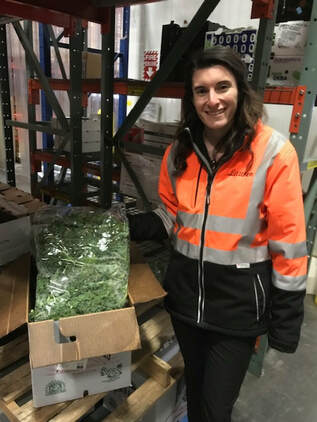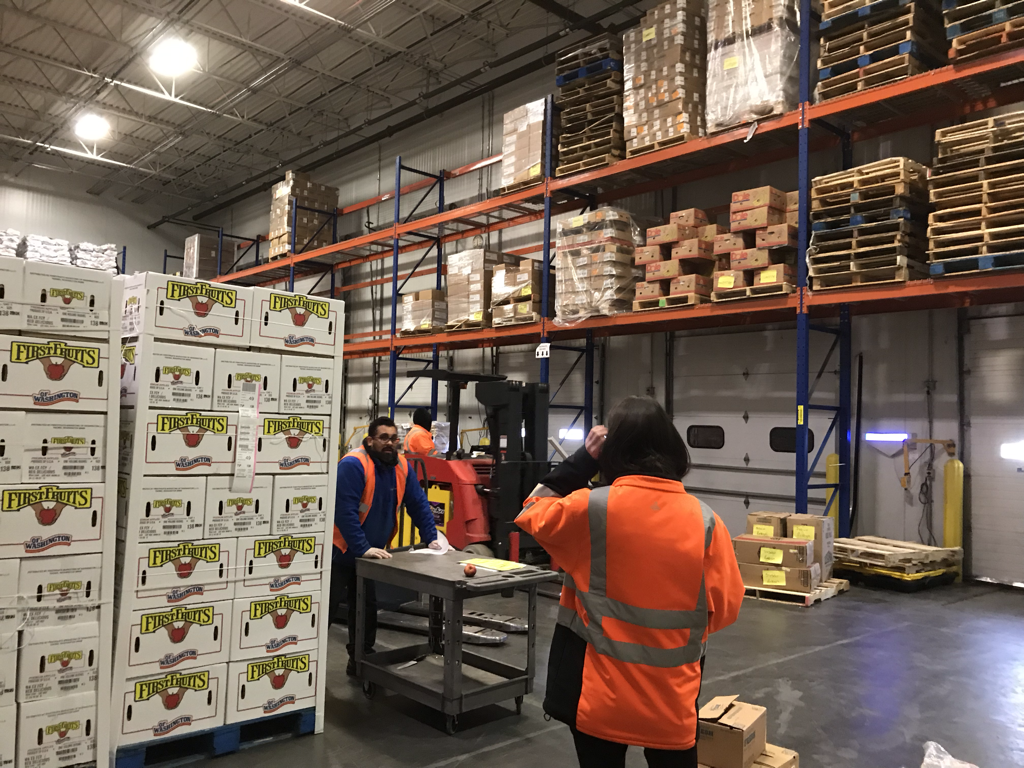|
Local Organic Y’All recently had the pleasure to visit the Raleigh warehouse of produce distributor FreshPoint and talk with their local specialist, Lauren Horning. Lauren is enthusiastically promoting local foods within her company and to its clients. The results are beginning to show. First, a little background. As its name implies, FreshPoint focuses on fresh produce -- fruits and vegetables, herbs and mushrooms --- as well as some dairy and local artisan items. The operation is a division of Sysco, the world’s largest broadline food distributor, with 60,000 clients including restaurants, institutions, hotels, and retailers. Sysco (and FreshPoint) also sell to institutional food service companies like Aramark and Sodexo. A broadline distributor may carry 15,000 different food items; that is, they have everything. From 2013 to 2015, Sysco attempted to buy rival U.S. Foods for $8 billion. The acquisition, which would have given the combined company a 75% market share, was stopped by the Federal Trade Commission. (Thank goodness.) I visited with Lauren on a cloudy Friday afternoon and donned an orange insulated coat for a tour of the building, situated on a cul-de-sac near the RDU airport. It consists of 25,000 square feet of cooler space (in three temperature zones) and some offices. Walking through the warehouse, Lauren showed me examples of products from local farmers, with some names that I recognized, and pointed out produce categories where more local sourcing might be possible. FreshPoint defines “local” as grown within 250 miles, and tracks product at 100, 250 and 500 mile ranges. (A 250 mile radius includes almost all of North and South Carolina, and Virginia.) Lauren also noted that the size of the farm matters; she is looking to work with small and mid-sized farms from one to 300 acres. Industrial-size produce farms with thousands of acres (and there are several in NC) are not her target source. Notably absent in the warehouse was much of anything organic. Why? Her restaurant and institutional customers almost never specify it. Her chef clients are requesting local items these days, but almost never something organic. This is the opposite pattern of supermarkets, which see more customer demand for organic than local. The reason for this difference is likely that chefs are buying local to support the community and farmers, and to feature seasonal and unusual items. In contrast, supermarket customers, and hence corporate buyers, are choosing organic for health reasons, to reduce exposure to pesticides. To make local work in mainstream retail, stores will need quality marketing and storytelling, so customers will buy it. To make organic popular with chefs, more customers simply need to request it. Going forward, Lauren sees multiple opportunities for local growers. She likes the potential of beets, leeks, rhubarb, sugar snap peas and other specialty items that farmers don’t typically grow for foodservice. She is not bullish on local carrots or onions, due to their cheap production in California. She recommends that if growers are interested in selling to her, they contact her in advance of harvest. She will work with growers to crop plan and plan for their food safety certification needs, which generally means Harmonized GAP. In addition, FreshPoint can provide extra insurance coverage for small and mid-sized farms. Lauren is a believer in the efficiency of backhauling. Rather than bring an empty truck back to the warehouse, FreshPoint can pick up local farm products after delivering to customers. What about ways to increase demand? Lauren believes that when customers ask for specific locally- grown items, the “ask” registers with their buyers and could influence future buying patterns. This is especially true, she believes, in the supermarket world, where repeat customers are the norm and customer retention is paramount.
To boost transparency, FreshPoint has a local farm finder on its website at www.local.freshpoint.com, featuring bios of the farmers they work with. A combination of online reporting systems and Lauren personally introducing clients to local products is opening the door to more local sourcing. FreshPoint has also worked with programs like UFOODS, a CEFS program designed to get more local produce on the campuses of six universities in North Carolina. I was pleased to hear that in recent days two supermarket chains have begun to work more with FreshPoint to access local product. Food Lion wants assistance from FreshPoint to get more local produce in its supply chain. Publix recently expressed interest in a partnership to source local produce for sixty-four stores. Regarding other supermarket companies, Lauren noted that some supermarkets have local programs that depend on buying from one or two large farms. (Boo.) Other grocers are trying direct store delivery (DSD) from farmers. DSD puts logistical pressure on farmers by drawing them away from their farms to deliver multiple times per week and, in addition, introduces food safety complexities. Besides produce and meat/dairy/eggs, some supermarkets are trying to source local specialty products like sauces and jellies. This has been a strong area for Whole Foods Market which now has a team of buyers called “foragers” to seek out artisanal products. FreshPoint, says Lauren, is quickly moving to source from more local artisans, and to channel them into their retail and foodservice accounts. This could be a good avenue to get more artisanal products into supermarkets, which have been a tricky market for many small food businesses. Raised on a hobby farm in Pennsylvania and the daughter of an extension agent, Lauren has been interested in local and organic foods for many years. She has worked on small farms and, before coming to FreshPoint, developed the “local” program at produce distributor Foster-Caviness. Having seen both sides of the food equation, Lauren is a good person to bring farmers and wholesalers together. Local Organic Y’All wishes her and FreshPoint continued success in supporting our small local farms. |
Archives
June 2021
Categories |


 RSS Feed
RSS Feed